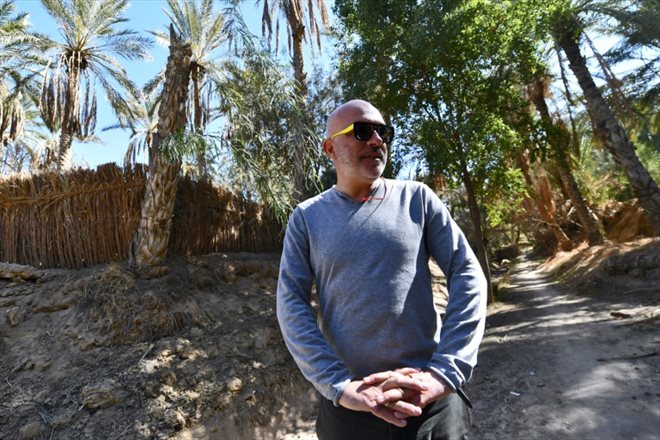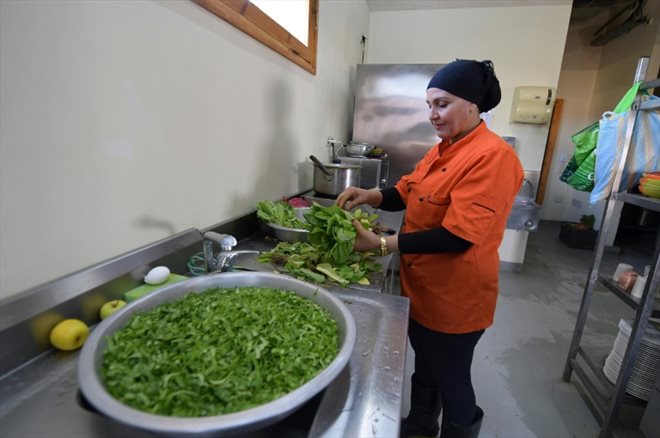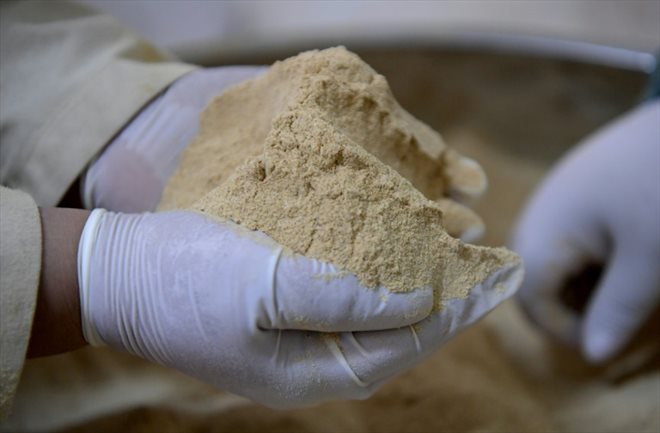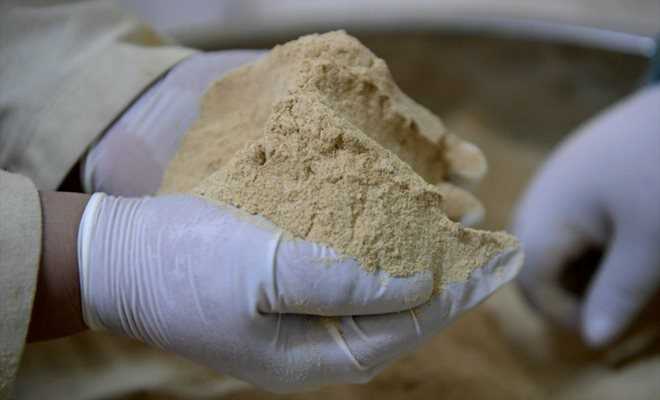Employees take care of the garden of the Dar Hi guest house, in the oasis of Nefta, 500 km south of Tunis, on February 12, 2022 (AFP/FETHI BELAID)
“In a palm grove everything grows”, gardener Mohamed Bougaa remembers the paradise that was once the oasis of Nefta, which a handful of lovers from southern Tunisia are trying to revive with nomadic cuisine and innovative projects.
“In the + basket of Nefta +, there were 152 sources which gave 700 liters of water per second”, recalls Mr. Bougaa, 63, including 40 as a sharecropper in Nefta.
But the water has been overexploited to create other palm groves and produce the famous date “deglet nour”, “the sources of Nefta dried up 20 years ago”, he explains to AFP in this oasis. 500 km south of Tunis.
Normally, “we can live from the palm grove, there is everything you need: salad, fruit, small peppers, tomatoes, carrots. Everything grows when we have sun and light. ‘water”, he adds, pointing to a pump now fed by groundwater.
The king tree, the date palm, can satisfy basic needs: “At noon, the workers here eat a few dates with milk, it’s nutritious”. This year, the harvest is mediocre: with the absence of rain and 55 degrees in August, the dates are “a little dry”, notes Mohamed.
– “Ancestral cuisine” –

Patrick Ali El Ouarghi, manager of the Dar Hi ecological guest house in Nefta, on February 12, 2022 (AFP/FETHI BELAID)
However, the palm grove is “permaculture (organic food production system imitating nature, editor’s note) before its time: a three-tier culture, with the palm tree protecting the fruit tree, the fruit tree protecting the vegetable garden, it’s natural in an oasis”, underlines Patrick Ali El Ouarghi, a Franco-Tunisian who created, in 2011, an ecological guest house in Nefta.
Dar Hi is also a laboratory of ideas, the “Palm Lab”, where artists, architects and engineers are invited to imagine how to preserve “this wonderful world” that is Nefta, a Mecca of Sufism. We must “rekindle the desire of investors, farmers, to reinvest in the oasis, which is a little in decline,” said Mr. Ouarghi, 54.
With his associates, this fan of innovation has “introduced new techniques, such as drip irrigation and solar energy”. He deplores the mess of the current system of flooding the plots – once a week – with water pumped from 100 meters deep.
To relaunch Nefta, Mr. Ouarghi and his friends have also written a book, “The cuisine of the oasis – Feeding on the essentials”, because “in an oasis we have nothing but we lack nothing”.
“It’s an ancestral and simple cuisine that dates from the arrival of the nomads”, he relates, when Nefta was “a place of passage for caravans” who “deposited unknown flavors and spices, which remained here as a tradition”.

Najah Ameur, chef at the Dar Hi guest house, in the oasis of Nefta, on February 12, 2022 (AFP/FETHI BELAID)
“One of the particularities of Nefta is that we manufacture our spices. It’s not the same as buying them at the market: the cleaning of the leaves, the smell, the taste, you know exactly how to do it” , confirms Najah Ameur, the chef at Dar Hi.
Mrs. Ameur, 40, prepares “her mother’s recipes” and others invented by “Fegh” (Frédérick E. Grasser-Hermé), a figure in French gastronomy. “A lot of ingredients come from the palm grove: parsley, celery, chard, green beans, peas,” she says.
– Date powder –
Not far from Dar Hi, other pioneers are trying to enhance the oasis.
Kevin Klay, former American aid worker in Sousse (north), fell in love with dates and the South. “We realized that 20 to 30 percent of dates are thrown away or fed to camels, just because they don’t look good,” he says.

Date powder produced by the company Dateible in Nefta, February 12, 2022 (AFP / FETHI BELAID)
He bought a few kilos, dried them at home and then ground them in a coffee grinder. Result: a powder “five times less caloric” than white sugar and “much healthier”, containing “more potassium than a banana”.
Mr. Klay, 35, launched his Dateible factory in 2018. It employs around ten people. His company receives, he says, “strong demand from the United States where it exports wholesale, and has launched retail sales, planning this summer a presence in (organic) +Whole Foods + supermarkets and to develop in Europe. “.
And since nothing is wasted in the palm grove, other ideas have sprung up in the oases to recycle dates: coffee with a date core or molasses for baking.
© 2022 AFP
Did you like this article ? Share it with your friends with the buttons below.




